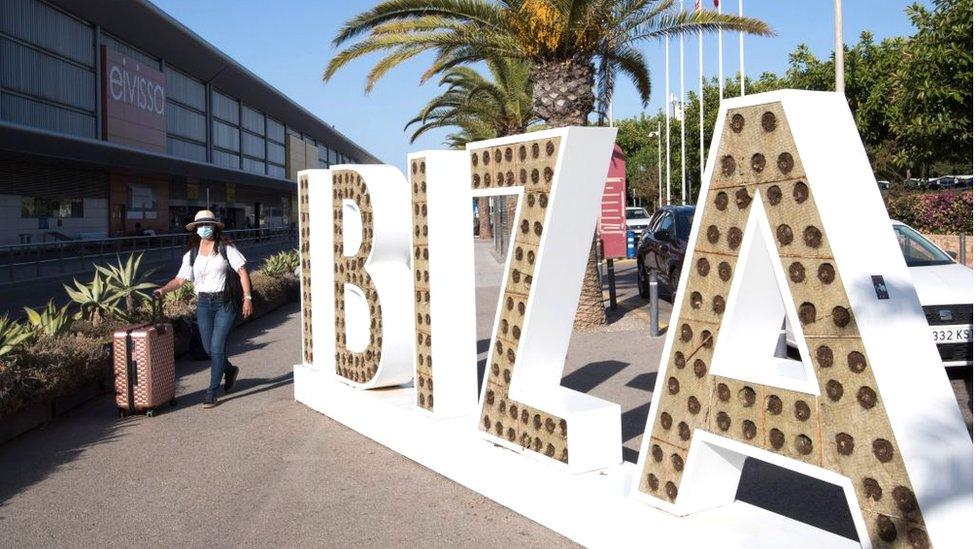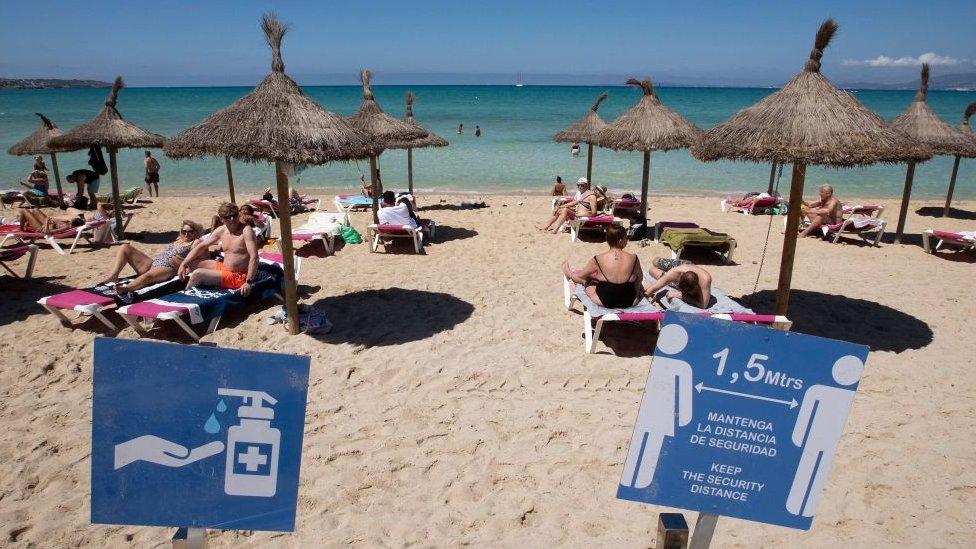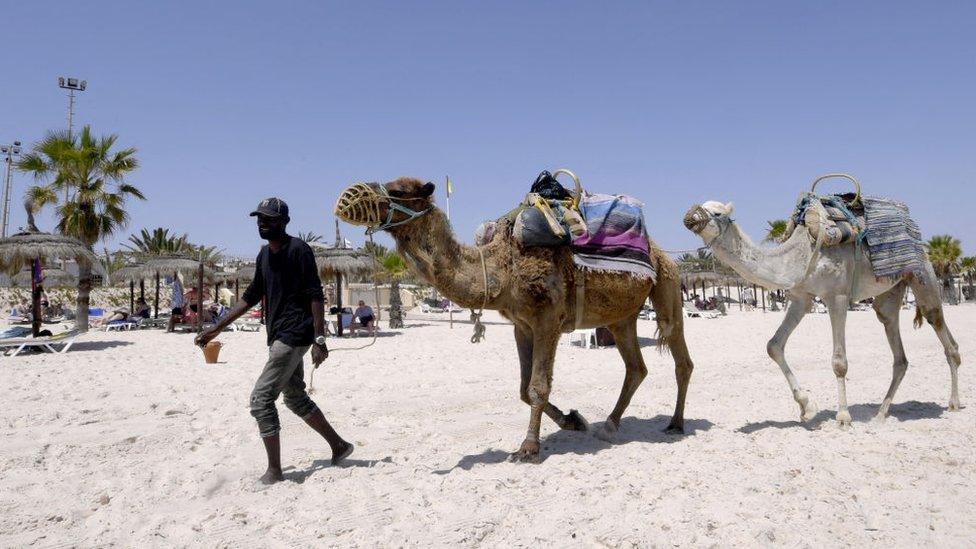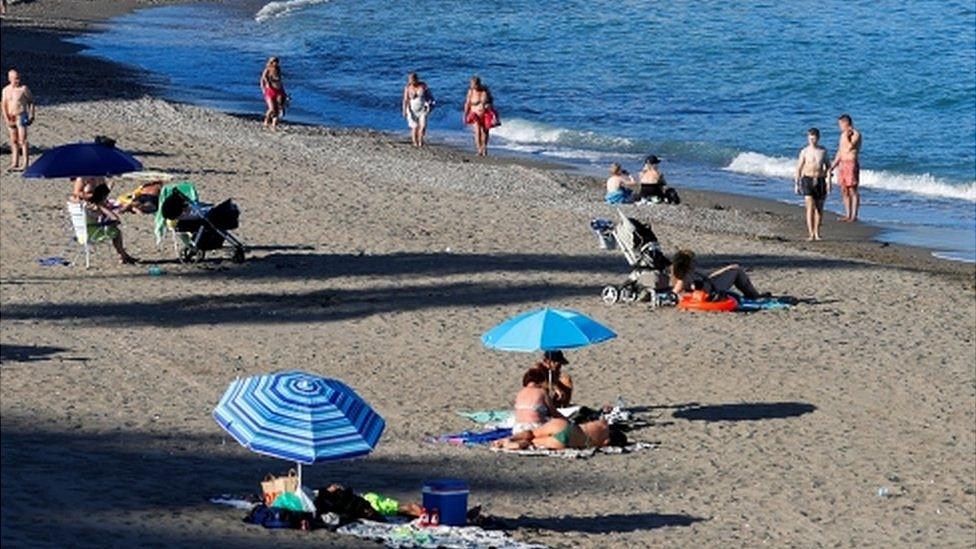Balearics, Malta and Madeira move to green travel list
- Published

Ibiza has made it onto the green list for international travel
A group of holiday hotspots have been added to the international green list.
From 04:00 on Wednesday, travel to Malta, Madeira and the Balearic Islands is allowed without having to quarantine.
Passengers arriving from those destinations are only required to take a Covid test on day two of their return.
The first flights from Scotland took off from Edinburgh on Wednesday morning.
Within hours of the restrictions being lifted, passengers flew from Edinburgh Airport to Ibiza and Majorca. More airlines will open routes to the new green list destinations from the weekend at other airports across Scotland.
However, the Scottish government said there would be close monitoring of the Balearics ahead of the next review of foreign travel guidance in three weeks.
The development comes in week one of the school holidays for most Scottish children.
Other additions to the expanded green travel list include Antigua, Barbados, and Bermuda.
Conversely a number of destinations - including Tunisia and Uganda - have been added to the red list which requires managed isolation for 10 days on return.
The "traffic light" risk warning system for international travel came into effect on 17 May.

Majorca and the other Balearic islands have been added to Scotland's green travel list
Under the rules, travellers returning from red list countries are required to enter managed isolation.
Amber list returnees must self-isolate at home with two Covid tests on days two and eight.
Travellers returning from green list countries are not required to isolate, but must take a Covid test on day two.
'It's easier and cheaper for students'
Student Louis Eastment was returning home to Majorca from Edinburgh Airport having finished a business course at university.
The 19-year-old is looking forward to enjoying the weather - and not having to isolate for 10 days having already produced a negative test result.
Edinburgh-based student Louis Eastment, 19, was one of the first to get on a Green List flight from Scotland
"It's much easier to get back home and cheaper for students, it's just a lot less stress," he said.
Speaking about the ongoing green list monitoring, he said: "I think it's better because it takes into account the specifics of each country instead of grouping everything together.
"Last time I did have to isolate so now I can get there and know I'm fine because I'll test myself when I get there just to be sure."
'Caution is required'
Although this is the longest the green list has been since the the traffic light system was implemented, the public has been warned before booking travel that the international situation can change at short notice.
Transport Secretary Michael Matheson said: "From the outset we have said caution is required regarding international travel and people should think very carefully about travelling abroad as situations can suddenly change.
"We continue to work closely with the other home nations and are cautiously supportive of exploring options for the easing of restrictions for fully vaccinated travellers arriving from countries on the amber list.
"But only if the clinical advice supports it and if systems are in place to ensure the wider safety of the Scottish population."
Travellers this summer will still have to follow the rules of the country they are travelling to.
Some countries require proof of vaccination and/or results of a PCR Covid test.
A vaccination status letter can be requested from the NHS Inform patient portal, external or via a freephone Covid status helpline on 0808 196 8565.

Which destinations are on Scotland's green list?

The Tunisian resort of Sousse joins the red list for international travel
The countries added to the green travel list on 30 June are: Malta, Madeira and the Balearic islands; the Caribbean nations of Antigua, Barbados, Barbuda, Dominica and Grenada; and the UK overseas territories of Anguilla and Montserrat, Bermuda, British Antarctic Territory, British Indian Ocean Territory, British Virgin Islands, Cayman Islands, Pitcairn, and Turks and Caicos Islands.
They join current green list countries Australia, New Zealand, Brunei Darussalam, Faroe Islands, Gibraltar, Iceland, Falkland Islands, South Georgia and the South Sandwich Islands, Saint Helena, Ascension and Tristan da Cunha.
The Dominican Republic, Eritrea, Haiti, Mongolia, Tunisia and Uganda have been added to the red list following the latest review.

On Tuesday, Portugal and Malta introduced measures to restrict UK travellers who are not fully vaccinated.
The Portuguese government said travellers must quarantine for 14 days unless they can prove they received their second vaccine dose a fortnight before arrival.
Malta is only allowing double-vaccinated people in from Wednesday.
In Spain, UK travellers need to prove they are fully vaccinated, or provide a negative PCR test on arrival. This includes travellers to the Balearics.

The measures have been introduced amid fears British travellers could spread the more contagious Delta variant of coronavirus, which was first identified in India.
The tougher restrictions across Europe come after Germany urged the EU to restrict UK travellers. German Chancellor Angela Merkel wants to designate the UK as a "country of concern" because the Delta variant is so widespread here.
Experts have warned that there is a civic duty to protect other countries from the Delta variant until their vaccine programmes caught up with the UK's.
Dr Elly Gaunt, a virologist at the Roslin Institute at the University of Edinburgh, said the restrictions on Scottish travellers were in-line with the infection rates in other countries, but did not reflect the rising cases in Scotland.
"The numbers yesterday were 70% up than what they were a week ago," she told BBC Scotland.
"We have this civic duty to protect other countries from the emergence of the Delta variant until their vaccination programmes can catch up."
She said: "The Alpha variant emerged in Kent and we didn't close our borders so we exported that around the world and we've seen the consequences in many, many deaths in other countries as a result of that.
"We are in the same situation where we have an extremely high rate of the Delta variant which is associated with increased hospitalisation, increased transmission and some immunoevasive properties, meaning that people who have already had Covid could be reinfected."
Dr Gaunt said it was risky to take that to countries with lower vaccine coverage and the health infrastructure needed to deal with outbreaks like the one in Scotland.
She added that she would not recommend travelling by plane, where air is re-circulated, because "the Delta variant is extremely transmissible in the air".
Travellers 'confused'
However, the travel industry welcomed the additions to the green list, while urging the government to go further.
Julian Slatter, from Edinburgh-based Ian Dickson Travel, warned that the system was still causing confusion and anxiety for travellers.
"The big uncertainty people have is if they're on holiday and it goes from green to amber," he told Reporting Scotland. "We've all seen how panic sets in and there's not often enough flights for people to get in.
"We need to have something that's more uniform so that people aren't going to a green list country that has a different rule to another green list country. We need governments to start talking to each other."
EasyJet has said the timetable "simply isn't ambitious enough" and British Airways said the announcement was not enough to help the sector recover from the pandemic.
Jet2 cautiously welcomed the announcements as "a step in the right direction".
The Association of British Travel Agents (ABTA) said the changes would "not on their own deliver the meaningful restart of international travel that the industry desperately needs".
Related topics
- Published24 June 2021

- Published28 June 2021
